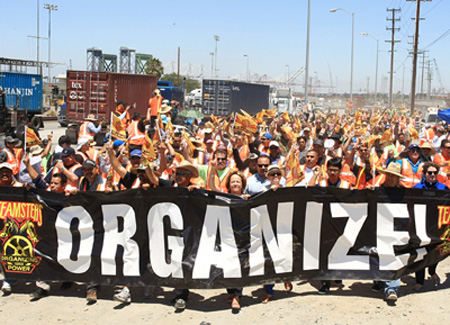| Text version of the Militant, a socialist newspaper | |||||||||||||||||||
 |
|||||||||||||||||||
 | |||||||||||||||||||
BY PHIL PRESSER
LONG BEACH, Calif. — Port truckers’ fight for a union is gaining strength and widening support. They are fighting to be recognized for what they are — workers — and to throw off the bosses’ “independent contractor” label that for three decades has been used to sow divisions and weaken their collective power. Truck drivers at three companies that operate at the ports of Long Beach and Los Angeles carried out a strike July 7-11, their fourth such action this year in their effort to join the Teamsters. A rally at the Los Angeles port on the last day of the strike drew hundreds of drivers and supporters. The more than 120 striking truckers are employed by Pacific 9 Transportation, Green Fleet Systems and Total Transportation Services Inc. They deliver containers offloaded from ships at the two ports to regional retail distributors, warehouses and other sites in the area. The port complex here is the largest in the country. “The National Labor Relations Board concluded that we are employees, but these companies continue to treat us as contractors,” said Douglas Herrera, who has been a driver for Pacific 9 Transportation for four years. Bosses have used the contractor classification to avoid paying minimum wage, workers’ compensation and payroll taxes and to foist operating expenses and risks onto the workers — from fuel and maintenance, to truck leases, parking and insurance. The workers are doubly taxed as so-called business owners, paying both the workers’ and bosses’ portions. After Pacific 9 workers challenged harassment and retaliation for their efforts to join the Teamsters, the NLRB ruled March 20 that they have the same rights to organize as other workers. About two-thirds of the 75,000 port drivers in the U.S. are misclassified as contractors. “I’m on strike because of all the pressure they put on us to take care of all these expenses,” Hererra said. After working 80 hours the previous week he netted about $800 after the company deducted $1,300 in gas, maintenance, parking and other expenses. “They own the vehicles, but we have to pay to park them at the company facility.” Hererra said sometimes their paychecks come out negative after the deductions. One of the leaflets drivers and their supporters have been using to gain support for their fight shows one of these negative paychecks. The strike had an impact on the port, briefly shutting down four terminals on the second day when hundreds of dockworkers, members of the International Longshore and Warehouse Union, walked off the job to honor the picket lines. They returned to work after a couple hours following an arbitrator’s back-to-work order. A similar ruling was issued after the dockworkers refused to cross the drivers’ picket line during a 48-hour strike in April. Preston Richie III, business agent for Teamsters Local 848, said the union is making progress in the fight to win reclassification. One firm, Shippers Transport, has agreed to negotiate with the union to reclassify its drivers as employees, he said, which is why that company was not struck. In addition to support from the Longshoremen, Teamsters from area locals, Service Employee International Union members and other unions, a number of community groups have joined the truckers’ 24-hour pickets at the facilities of the three targeted firms and at the ports of Long Beach and Los Angeles. Well-known musician Tom Morello, an original member of rock band Rage Against the Machine, joined the picket line July 9 with his guitar. Pickets would stop each truck or car from entering a facility for several minutes, creating long backups at terminal entrances and gates to the facilities. “I want all the port drivers out there — and not just those in Los Angeles but nationwide — to see that when you stand together and fight you can accomplish things,” driver Alex Paz told Press TV on the picket line in Los Angeles July 9. “It’s time to come out of the shadows and fight.”
| |||||||||||||||||||












